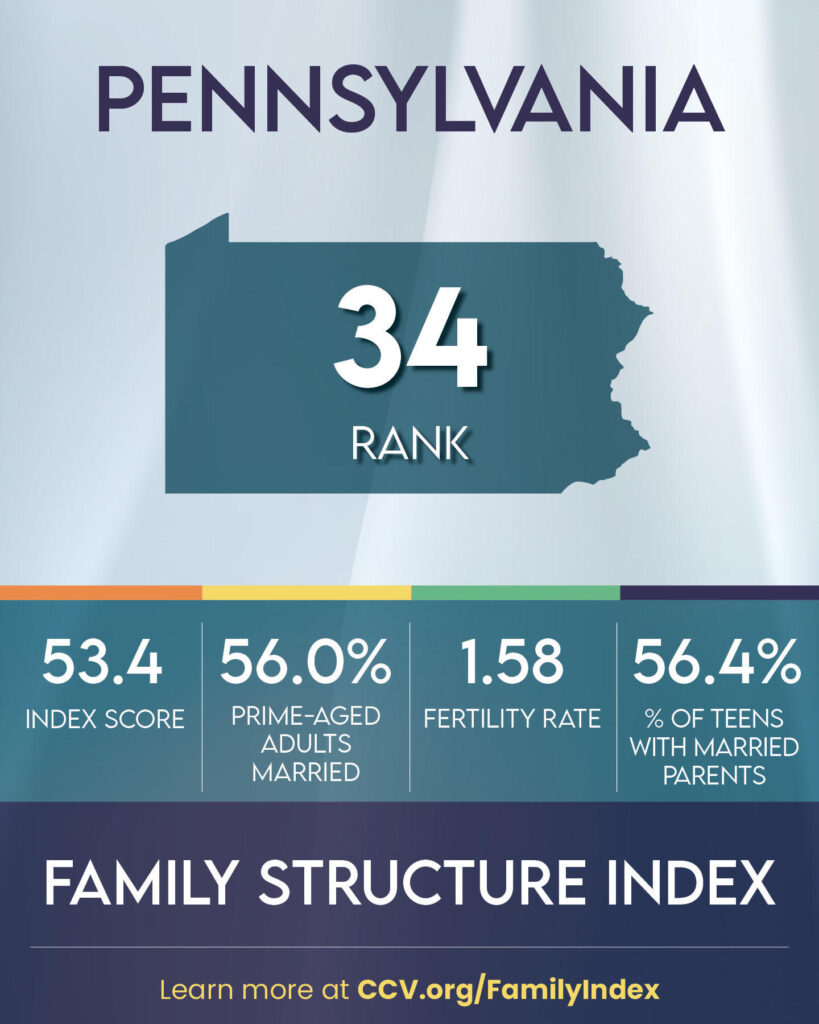Pennsylvania is facing a serious crisis when it comes to family stability. According to the newly released Family Structure Index, Pennsylvania ranks 34th in the nation—trailing behind states with far fewer economic resources. This ranking is not just a number; it reflects the state’s declining marriage rates, low fertility rates, and the decreasing number of children being raised in intact families.
“Pennsylvania should be a national leader in family stability, yet we are shockingly underperforming,” said Michael Geer, President of the Pennsylvania Family Institute. “The data proves that family structure is a key driver of economic well-being, and our state is failing to provide the conditions for strong, stable marriages and families. If we continue down this path, we will see increased poverty, declining social mobility, and long-term damage to Pennsylvania’s communities.”
The Data Behind Pennsylvania’s Decline
The Family Structure Index, developed by Brad Wilcox, Professor of Sociology at the University of Virginia, in partnership with the Center for Christian Virtue and The Institute for Family Studies, ranks states based on three core indicators:
- Marriage Rate: The percentage of adults aged 25 to 54 who are married. In Pennsylvania, only 56% of prime-aged adults are married.
- Total Fertility Rate: The average number of lifetime births per woman in the state. Pennsylvania’s fertility rate is 1.58, well below the replacement level of 2.1.
- Intact Family Rate: The percentage of children aged 15-17 who are living with their married parents. In Pennsylvania, this figure stands at 56.4%—a troubling indicator of family breakdown.

Bad Policy Decisions Are Making Things Worse
Pennsylvania’s poor ranking is not happening in a vacuum—it is the direct result of bad policy decisions that weaken marriage and family life.
Divorce Law Overhaul: A Step Backward
Last year, the Pennsylvania House of Representatives considered House Bill 2303, introduced by Rep. Kristine Howard (D-Chester). This bill sought to make it easier and more efficient to obtain a divorce by stripping away essential protections meant to encourage reconciliation. As Tom Shaheen, Vice President of Policy for the Pennsylvania Family Institute, warned at the time:
“This bill prioritizes convenience for the adults in divorces over family preservation, replacing the goal of reconciliation with mere ‘harm mitigation.’ It appears to sanction divorce regardless of the damage inflicted on spouses or children, and without encouraging efforts to resolve issues and restore relationships.”
Efforts like HB 2303 only accelerate the breakdown of families rather than encouraging couples to seek counseling and work toward reconciliation.
Redefining Marriage in Pennsylvania
Another harmful policy change came when the Pennsylvania House passed House Bill 2269, which removed the definition of marriage as between one man and one woman from state law. The bill disregards the primary reason the government is involved in marriage—to ensure that children are raised in the best possible environment, with both a mother and a father.
“Marriage brings together the two halves of humanity, the union of one man and one woman, together as husband and wife to care for each other and to be father and mother to any children their union produces,” said Michael Geer. “This is the vital public interest and objective reality that governments throughout history have recognized, including Pennsylvania.”
Instead of strengthening marriage, Pennsylvania lawmakers are working to redefine it, further eroding the institution and weakening family formation.
The Impact of Retail Marijuana Legalization on Families
Adding to the instability, Governor Josh Shapiro and some Pennsylvania lawmakers continue to push for retail marijuana legalization—despite mounting evidence of its harmful impact on families and marriages.
Judge Cheryl Lynn Allen, former Pennsylvania Superior Court judge, has warned that increased drug availability devastates families, particularly in minority communities:
“The breakdown of families remains one of the most pressing challenges facing Black communities. As a juvenile court judge, I saw how substance abuse was consistently the primary reason children entered the foster care system. Young people who use marijuana are more likely to struggle academically, cognitively, and socially.”
Research from states that have legalized marijuana, such as Colorado, shows that for every $1 in economic benefits, over $4 are spent on addressing the social consequences—including increased addiction, higher crime rates, and negative outcomes for children.
Solutions: How Pennsylvania Can Strengthen Families
- Eliminate Marriage Penalties: Tax and benefits systems should encourage marriage, not penalize it.
- Require Public Schools to Teach the Success Sequence: Research shows that individuals who graduate high school, secure a job, and marry before having children are significantly less likely to experience poverty. Pennsylvania should mandate that public schools teach this proven path to success.
- Launch a Public Awareness Campaign on Marriage: The state should invest in educating the public about the benefits of marriage and family stability.
- Reduce Planned Parenthood’s Influence in Schools: Schools should promote marriage and family stability.
“States that support strong family structures reap the rewards of lower poverty rates, better educational outcomes, and economic prosperity,” said Tom Shaheen. “Pennsylvania must take immediate action to strengthen marriage and family life or risk further decline.”
A Call to Action
The data is clear: Pennsylvania has been failing families, and unless real change happens, the situation will only get worse. Family stability and marital strength is not just a personal issue—it’s a societal issue that affects economic prosperity, child well-being, and the future of our communities.
For the sake of all Commonwealth residents, Democrat or Republican, we must push back against policies that undermine marriage and family, and instead work to build a culture that encourages strong, lasting marriages between one man, and one woman.





